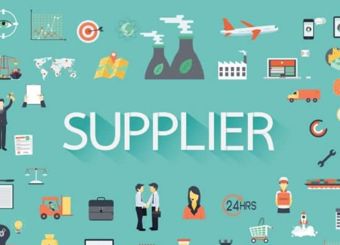Supplier management: the tools your organization needs
The market is flooded with different supplier management tools, so it can be difficult to figure out which one is right for you. In this blog post, we’ll explain what’s involved in supplier management and how different tools can help manage the process.
Supplier management: the basics
Supplier management, also known as vendor management, is a very broad term, but the process includes key elements such as:
- Supplier Information Management involves capturing, storing, updating and analyzing all supplier information
- Supplier Relationship Management requires building professional relationships and connections you can rely on
- Supplier Performance Management is about ensuring that your suppliers are delivering what was agreed on in the contract, in an efficient and timely manner
- Supplier Risk Management helps to identify possible issues that might accrue and ensures contingency plans are in place
- Supplier Compliance Management, which ensures all your suppliers have the required certificates and accreditations to do business with you.
The importance of supplier management for your organization
Any business, large or not, relies on its suppliers to operate. Working with dependable and compliant vendors, whose objectives align with yours can help you both. It can help your sourcing team to lower supply chain risks, increase savings and gain a competitive edge. It is easier to negotiate better contract terms for both companies when both sides want to achieve similar goals.
We understand that successful supplier management is not profoundly based on social interactions between the buyer and the vendor, but it is necessary to create a strong professional relationship.
Identifying your key suppliers can be a complex and time-consuming process. Especially for companies with large supplier bases and/or manual processes in place, as it takes a lot of resources to complete without the necessary tools to support this process. However, it’s important to know who you should build strong relationships with.
Supplier management technology
The market is full of different supply chain tools that can help you identify suppliers and support building a strong relationship with them, as well as identify any supply chain opportunities your organization may be currently missing out on.
But how do you know which solution will work best for your company? Each organization is unique, and as such, will need different tools. We’ve compiled a list of solutions that might help your business:
Vendor management tool #1: eSourcing
eSourcing solutions are designed to help you find compliant suppliers that will be able to meet your organization’s needs for the right price. They automate the entire tender process, from creation and distribution to analyzing supplier responses and awarding the contract.
Tender creation is simplified with question templates and a pool of options making it quick to create all required questions.
Additionally, the user can add scores against each question, which speeds up the analysis process, as the system will automatically assign scores based on the answers. Some scores will have to be assigned manually based on the supplier’s responses, but the solution can automate parts of this process and give your team more time and control.
Once the tender is published, you can share it with any suppliers you want via a spend management platform, and they will be automatically alerted about any detail changes and deadlines.
Keeping everything in a centralized location makes awarding to either one or multiple suppliers smoother and faster. All authorized users can access the latest information through the system, so there are no delays caused by documents being scattered across the business. You can also store your historic tenders, leaving a full audit trail from start to finish.
Some eSourcing tools also give you the ability to run eAuctions, which allows you to negotiate better contract terms in a controlled environment. An electronic auction is an event that allows suppliers to bid against each other for your contract in a digital real-time bidding environment. Solutions like Medius Spend Management enable you to host an easily accessible eAuctions, all the suppliers need to bid for your business is an invitation.
The advantages of using online auctions include saving money, time and getting better contract terms.
Vendor management tool #2: contract management
Contract management tools enable users to have full control of all supplier contracts in a centralised database.
No one wants to have supplier agreements rolling unchallenged from year-to-year, locking you into increasingly poor pricing and service terms. Contract management platforms offer a set of features that can help you stay up-to-date and in control.
Automated renewal and performance review alerts will ensure your team never misses any important deadlines. You also want a platform where you can set different user permission levels, so only authorized employees have access to the vendor contracts.
In addition, most contract management tools offer a comprehensive set of reporting and search features that allow you to find specific information at a click of a button.
Vendor management tool #3: source to contract
Source to contract solutions combine eSourcing and contract management functionality, which can make your team even more efficient. The ability to create and access tenders, auctions and supplier contracts in one system will save time and empower your team to make strategic and well-informed decisions.
Source to contract software allows users to pull through any relevant information from the initial tender all the way through to auctions and then contracts, automating most of the process. This can help to improve your team’s efficiency, productivity and minimize errors.
Additionally, access to real-time information will always enable your team to stay up to date and historical audit trails allow you to see what has been changed, when and by whom.
Vendor management tool #4: Supplier Information Management (SIM)
Supplier information management empowers your team to cut costs and decrease supply chain risks. Managing vendor information electronically allows suppliers to self-serve via the supplier portal where they can update their details, send required certificates and update them when they expire.
The solution automatically reminds your supplier about any actions required from them, whether it is an update to invoice details or uploading a new ISO certification that is needed for you to be able to trade with them. If there is a delay in receiving requires accreditations, the tool will automatically put any non-compliant vendors on hold, preventing you from purchasing from them.
Integrating this tool with your finance/ERP system will ensure an up-to-date view of information across all sourcing and procurement solutions you may have.
Vendor management tool #5: Supplier Relationship Management (SRM)
Supplier relationship management (SRM) software is designed to support you building and maintaining strong professional relationships with your supplier.
SRM tools will make collaboration between you and your vendors seamless. Being able to manage meetings, questionnaires and message each other in one place, can help to keep all required parties up to date with the latest information and avoid misunderstandings or errors.
The software also allows you to segment your supplier base into and will then, automatically apply the appropriate level of management activities based on the importance of the vendor to your business.
In the perfect world, every organization would use all the platforms highlighted above to maximize efficiency, control and profit, but unfortunately, that is not the case. However, that doesn’t mean we shouldn’t work towards such a situation.
Review your processes, identify the areas that need improving and prioritize. See which solutions would be the most useful for you and your business or if you are already using some of the tools, check that they are doing everything you need them for.
To learn more about how Medius can assist you with your supplier management needs, please contact us.





